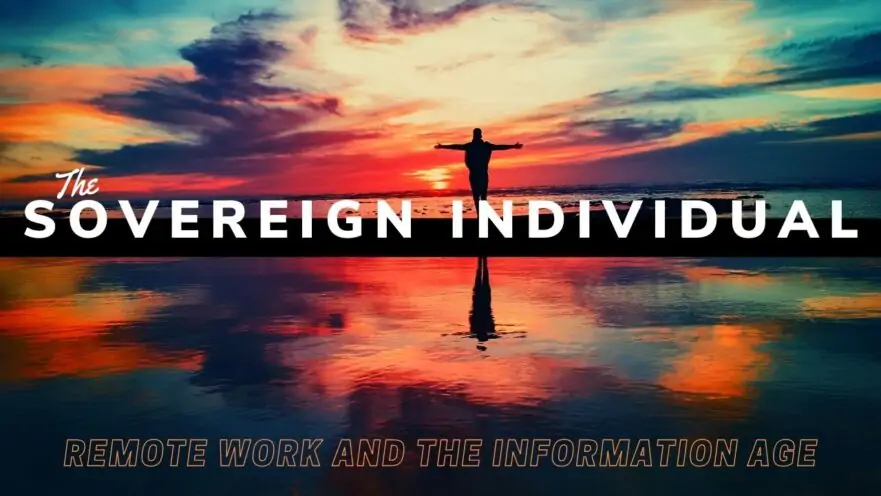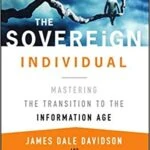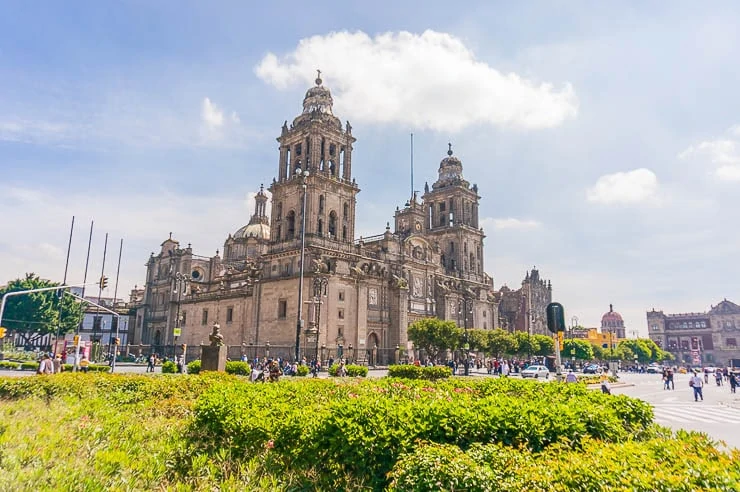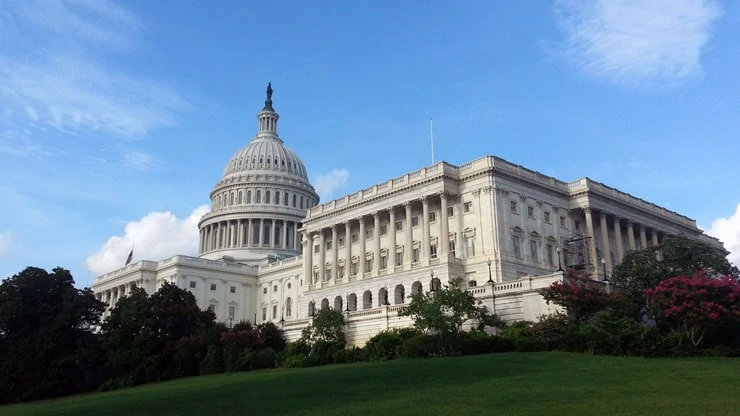A book that is equal parts prophecy and history, the Sovereign Individual by James Dale Davidson and Lord William Rees-Mogg, is one of those profoundly impactful books that will cause to you to think deep about what the future holds (good and bad) and what you should/would do to embrace, prevent, or shape that change. Originally published in 1997, the authors have predicted to a surprising degree of accuracy as to the effects and implications of the world’s transition to the Information Age.
The Sovereign Individual is a book that I recently became familiar with, as a result of diving deeper into some of the concepts discussed by Balaji Srinivasan (via Tim Ferriss’ podcast) and his ideas regarding remote work and startup cities. It has been heralded by many as having an incredible foresight that speaks to what we are going through right now in the 2020s. Plus I also love “big idea” books that speak to the overarching trends within human history (Sapiens by Yuval Noah Harari or Guns, Germs, and Steel by Jared Diamond).
This book certainly did not disappoint, and while I certainly don’t agree with everything the authors laid out, I can’t deny that this dense and challenging read left me enlightened, surprised (at the present-day accuracy of a book published nearly 25 years ago), saddened (at some of the dystopian images painted), and also optimistic (for some of the other possibilities their predicted future entails).
Let’s dive a little deeper into some of the central ideas in this Sovereign Individual: Mastering the Transition to the Information Age review and recap.
The Sovereign Individual Summary
As mentioned, the book attempts to predict the ensuing impacts of the transition to the Information Age or Information Revolution (the Internet) and what it holds in store for human society. They argue, and I think it would be hard to deny, that the Internet is a fundamentally revolutionary moment for humans akin to the Agricultural Revolution and the Industrial Revolution.
While it seems incredible to me that websites like Facebook are nearly 20 years old, this is but only the nascent moments of the Information Age in the grand scale of human history. According to the authors of The Sovereign Individual, we are at the precipice of the Fourth Stage of Human Society:
- Hunter-Gatherer Societies (Pre-10,000 BCE)
- Agricultural Societies (10,000 BCE)
- Industrial Societies (1760 CE)
- Informational Societies (~ 2000 CE)
Looking backward, each of these ages held profound changes for humans, introducing new possibilities and new problems, while fundamentally altering how we live. For example, the rise of agriculture brought about a new abundance of food, and the ability to store grains and plan for the future, while it also increasingly incentivized the logic of violence as groups would war over territory and resources, among other impacts. There was no real incentive for accumulation or private property in Hunter-Gatherer societies since surplus food would spoil and excess physical belongings would slow you down as you moved from place to place. As Yuval Noah Harari pointed out in Sapiens:
The Agricultural Revolution certainly enlarged the sum total of food at the disposal of humankind, but the extra food did not translate into a better diet or more leisure. Rather, it translated into population explosions and pampered elites. The average farmer worked harder than the average forager, and got a worse diet in return. The Agricultural Revolution was history’s biggest fraud. Who was responsible? Neither kings, nor priests, nor merchants. The culprits were a handful of plant species, including wheat, rice and potatoes. These plants domesticated Homo sapiens, rather than vice versa.
The Sovereign Individual attempts to make an educated guess about the future implications of the Information Age by using these previous fundamental shifts as a lens from which to view it. Within these primary stages of human societies, there are also other cycles that permeate human life. The authors contend that the most prominent of these is a 500 year cycle in Western Civilization that dramatically upends old systems:
- 500 B.C.E. – Rise of Greek Democracy of Constitutional Reforms
- 4 B.C.E. – Rise of Christianity and the Emergency of an Ancient Economy under Romans
- 490 C.E. – Fall of Roman Empire and the so-called Dark Ages
- 1000 C.E. – Rise of Feudalism in the Middle Ages and a Rebirth of Money, International Trade, and Education
- 1492 – The Renaissance or Gunpowder Age with the Birth of Colonialism and Conquest, the Printing Press (and Reformation), Advanced Weaponry, the Birth of Modern Science, etc.
- 2000 – The Internet and Modern Technology, Decentralization, Automation, Robotics, and More
The central tenet of the book is that the Internet, microprocessors/computer power, and encryption will open entirely new frontiers whereby commerce, business, finance, and other things will be conducted entirely online in this new ecosystem. In 1997, these were pretty forward thinking ideas, now we take them for granted. Like, of course, we can buy anything and everything online from Amazon. Of course, I can send money to friends and family at the click of a button.
What isn’t clear (even today) is what exactly are some of the deeper implications in terms of human society. In the book, they boldly predict some of these effects, including the rising income inequality within developed countries as low-skilled workers get left behind in the tech revolution, or the rising equality between countries as developing countries leap ahead, skipping previous technologies.
For some time now, in the United States, we’ve seen high paying, low skilled jobs getting outsourced to other countries or become redundant due to advances in machinery and robots, whether it is on factory floors or coal production. In the developing world, you’ll find people in Latin America who still can’t open a traditional bank account, but can now send money peer to peer, overseas with cryptocurrency on their android phones (“cybermoney” was another prediction of the book, more than 10 years before Bitcoin) — just look at the recent developments in El Salvador. There are millions of people in Africa or India who don’t have modern sanitation or running water at home, while at the same time are able access the world thanks to their cellphone. They didn’t have to go through dial up modems and landlines for Internet, they skipped straight ahead to cellphone towers and wireless access.
The rising income inequality within countries, particularly among the more economically developed and rich countries was predicted in the book to lead to rising calls of nationalist rhetoric, anti-immigration and backlash by those left-behind. Something that seems all-too-familiar or mundane after Donald Trump and similar backlashes in Western Europe.
Modern democratic politics provides them with an open channel by which to legitimately seize power in the nation-state. A system that routinely submits control over the largest, most deadly enterprises on earth to the winner of popularity contests between charismatic demagogues is bound to suffer for it in the long run.
Perhaps the most audacious claims of the Sovereign Individual is in the demise of the modern nation state. The underlying premise being that the rise of ecommerce, cryptocurrency, and other tech innovations will lead to a diminishing ability for the government to tax and rule, causing states to undergo a sort of Balkanization into smaller city-states like days of old.
In their idealistic Libertarian imagining, the new Sovereign Individuals (the ultra wealthy) would then be able to shop for the best place to live and reside. They would become customers of governments and seek out the place best aligned with their ideals, budget, etc. (just like shopping for car insurance). In turn, the birth of many hundreds or thousands of new city states would need to compete amongst one another to attract money and talent… Obviously, by providing the best service at the lowest cost. Free market capitalism in other words.
They draw many parallels between the dissolution of the Church’s power in the 15th century and the projected demise of Nation States in the near future. The Catholic Church was the most powerful ruling institution at the time in Europe but which was undermined by the invention of the printing press and the democratization and decentralization of information, religion, and education, putting the power into the hands of the many, rather than the few as it was siphoned into the church bureaucracy and clergy.
This major transition in government gave rise to early nation states and the culture that allowed the Protestant Ethic (see Max Weber) to eclipse the Catholic Church. It was how Northern Europe ultimately broke away from Southern Europe and became the economic powerhouse of the region (and world, at the time). Even to this day, the southern Catholic parts of Europe are still mired in economic problems compared to their Protestant neighbors to the north.
In the Sovereign Individual, they posit that the invention of the internet and everything else that entails will have a similar effect on nation states, where the democratization and decentralization of information, commerce, business, and finance in the cyber realm will ultimately weaken the increasingly irrelevant borders and undermine the power of the government to compel individuals with the threat of violence or reprisals for taxes and other “unjust” impositions on the Sovereign Individual.
It is a classic sort of ultra free market, capitalistic approach to future governments. Honestly, this is the part of the book that is most difficult to swallow and paints a pretty disturbing picture for the future if it were to come true. While I have my doubts about the underlying premise, even if this is the natural evolution of the global political and economic systems, I highly doubt it would come to fruition within my lifetime.
Furthermore, when one starts to dig a little deeper into the network and world within which the authors operated, one starts to question whether these “predictions” were really reading the tea leaves of the future or more of a manifesto that was about pushing their own underlying political goals for the world.
The authors, and many of their cohort, have been actively trying to undermine government for some time. It is basically in the same sort of vein as when disingenuous republicans are elected to office and do their darnedest to destroy institutions, install inept public officials, engage in cronyism, theft, deceit, sabotage, etc., so they can turn around to voters and say “see, I told you the government doesn’t work!” and then those same voters continue to vote against their own interests with the same leaders who are trying to destroy the federal government from the inside.
Ultimately, the Sovereign Individual paints a picture of creating ultimate freedom for the ultra-wealthy few with no loyalty to place or country, and predicts that crime and violence will rise as a result, particularly small scale and random violence. I think we are already seeing this in forms like terrorism, gun violence, and even the online extortion rackets like ransomware.
Like I said, it is a pretty dystopian picture where everything has been privatized and the Sovereign Individual is holed-up in their walled off compound or locked away with private armed guards (sounds a lot like Libertarian Honduras). In many ways, it sounds like the worst of the failed nation states of today, hardly like places where the ultra rich would relocate just so they could save on their taxes. Indeed, this image is basically the opposite of what so many of us strive for in the pursuit of location independence or the digital nomad lifestyle.
While I don’t envision this sort of doomsday scenario occurring in my lifetime, I do still think there are a number of important underlying ideas that might help guide future plans and decision making, particularly among younger generations.
Takeaways For the Reader
Whether the book was prescient foresight or a subtle attempt to guide their Libertarian utopia/dystopia into being, the book still offers much food for thought even nearly 25 years after it was originally published, including some important lessons that I believe are relevant (regardless of your political outlook) in the Information Age.
Location Independence
While the term location independence was never used in the book, I couldn’t help but be reminded of it as I read. The book mostly framed a Sovereign Individual as the ultra wealthy trying to escape high and “unfair” taxes, but I feel like the basic premise much is relevant to those pursuing location independence or a digital nomad type lifestyle and is actually much more relatable to the masses (most of us aren’t going to be part of the Ultra Wealthy).
Basically, by becoming a remote worker or creating an online business, you can free yourself of being beholden to any particular physical location. I don’t really think the primary benefits are from the tax prism, but rather in the overall cost of living frame of view. Previously, to get a good paying job, you needed to be in a big city, which goes hand in hand with a high cost of living. Today, if you’re working in the Information Age, you could be working just as easily from a coffeeshop in Medellin, Colombia as you would in Silicon Valley. But you’d be doing so at a fraction of the cost.
It’s important to realize that this street goes both ways. There are also millions in developing countries who are working online, earning money in dollars, and able to live a better life. They don’t necessarily have to immigrate to another country, they just need access to the internet. You’ll find huge numbers of freelances doing just that in places like India or the Philippines, often able to earn much more online than they would locally. This makes them digital nomads, effectively, without even leaving home. My partner, Andrea, recently transitioned into teaching Spanish online and now makes basically as much as her well-paying engineering job but without a boss or a commute.
Most of us never take a holistic view of how much money we are truly making at our job by factoring in all the indirect costs like commuting (both in time and in dollars), having to eat out (convenience spending), professional attire, formal education, your rent/mortgage to be near work, and so forth. You’d probably be surprised at what your true hourly wage is in this scenario and how easy it would probably be to make the equivalent in a remote job with a lower cost of living environment (it doesn’t have to be overseas, either, many can take advantage right within their own country).
This is one of the fundamental appeals of the startup cities movement. A better work-life balance with a much reduced cost of living.
Tax Optimization
As I said, I’ve never viewed location independence primarily in terms of tax benefits but rather just a general cost of living savings. I believe in paying your taxes, of course, but it is also a pretty universal truth that everyone prefers paying less taxes rather than more, and certainly does not want to pay more taxes than they legally have to. No one is donating money to Uncle Sam.
While the book predicted that High Net Worth Individuals would be fleeing the country in search of low tax countries or tax havens, that just really does not seem to be true, even among those with the most to gain. I don’t see Jeff Bezos, Warren Buffett, Bill Gates, or Elon Musk eager to renounce their U.S. Citizenship and heading to some third world country where they would undoubtedly find more personal and economic freedom. That just doesn’t happen, even if there are places with a much lower overall tax burden instead of having to evade it by taking loans against their assets.
It’s not unlike the people who argue for unfettered gun rights… Like, why not just move to Somalia or Yemen? You’d have the freedom to get your hands on virtually any gun you like, without government interference. There are plenty of countries that offer more individual freedom from government if that’s what you’re after. Put your money where your mouth is, like the Polygamist Mormons who fled across the border to Mexico when the Federal government put an end to polygamy. You could have all the wives and guns you want in Yemen, for sure, and not pay any taxes to boot.
It is true, however, that the rich may relocate within the United States, as Elon Musk did when moving from California to Texas to try and avoid regulation and taxes. Obviously, the same sort of approach is possible for any modern digital nomad or location independent entrepreneur, by establishing residency in lower tax states where you might be able to save on income tax, capital gains, or property taxes if you decide to settle down. You can earn a San Francisco salary while living in Tulsa, Oklahoma.
For those digital nomads that go overseas long-term, you may be able to take advantage of the Foreign Earned Income Exclusion to lessen your tax burden. It does require, at minimum, being physically present in a foreign country or countries for at least 330 full days during any period of 12 consecutive months. The United States is one of only a few countries that has world wide taxes on its citizens (rather than just those who physically live there).
It is pretty eye-opening when you realize that being able to save, for example, $6,000 in taxes paid every year and instead redirecting into investments with a 10% annual return would amount to $1,000,000 in just 30 years. 10% is the average annual return of the S&P 500 (before inflation), so it is basically a set it and forget it type of investment in an index fund. $6,000 is also the current annual limit for Roth IRA contributions, paid for with after tax dollars and without having to pay capital gains at retirement age.
Future Proof Yourself
I see location independence or digital nomads as being in the best position to ensure they remain adaptable and resilient in terms of economic opportunities in the future in a variety of ways. Not only is it basically the future of work, but it is also as a way to be resilient other external factors, like climate change — allowing you to go to areas not as heavily impacted or to simply move with the changing of the seasons (avoid the cold winters, if you want).
Furthermore, an undetermined number of industries are going see countless jobs become redundant or irrelevant in the coming decades with the rise of automation, robots, and artificial intelligence. This is an undeniable reality. Politicians can promise the return of coal miner jobs to get cheap votes, but those companies require less employees to do the same job compared to years past.
While some traditional jobs are likely to remain relevant for some time to come, many more are on the chopping block in the near term (Amazon fulfillment workers, truck drivers, taxi drivers, and more). Being involved in the technological and information space, means being able to stay more competitive and well positioned to embrace changes as they come.
Another prediction of the book was the dissolution of lifetime jobs/careers and the growth of more task type work (gig economy). Being an information age worker means being able to roll with the punches. By staying on the cutting edge, you can ensure that you don’t get cut (at least not as badly) by the tech revolution.
Read More: 42 Side Hustle Jobs
Final Thoughts on the Sovereign Individual
One of the top reviews of the Sovereign Individual on Goodreads summarized the book as “implementation details of Atlas Shrugged,” which is like the holy book for Libertarians. I’ve never read it, and certainly don’t consider myself a Libertarian, but I found the Sovereign Individual to be an interesting and compelling read. One thing the book really failed to do was paint a picture of what we can do to make this predicted future a better place. It mostly paints a bleak future and implores the wealthy individual to take actions to weather the storm ahead.
I don’t have the answers to those questions, but the book makes me consider them more. While I fully embrace the strive toward becoming a sovereign individual or pursing location independence, that doesn’t mean that we shouldn’t be considering how we can make a better future with a community, roots, connections, or a better collective experience for us all. We are still social animals.
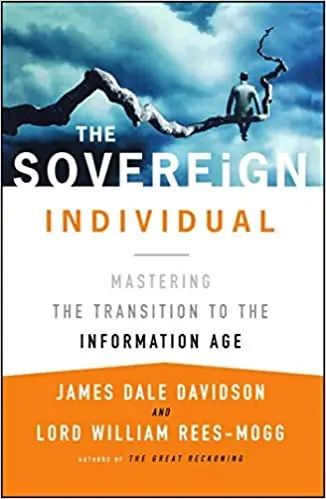
There will be challenges, of course, but I remain confident that the Information Age will continue to surprise us and empower us, whether you’re a so-called Sovereign Individual or not.
Share This
Did you enjoy this review of the Sovereign Individual? Take a second to share it on Facebook, Twitter, or Pinterest. Thanks!
Ryan
Latest posts by Ryan (see all)
- Kazakhstan Food: Exploring Some of its Most Delicious Dishes - August 7, 2023
- A Self-Guided Tour of Kennedy Space Center: 1-Day Itinerary - August 2, 2022
- Fairfield by Marriott Medellin Sabaneta: Affordable and Upscale - July 25, 2022
- One of the Coolest Places to Stay in Clarksdale MS: Travelers Hotel - June 14, 2022
- Space 220 Restaurant: Out-of-This-World Dining at Disney’s EPCOT - May 31, 2022

